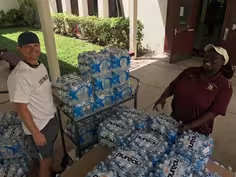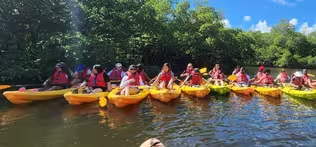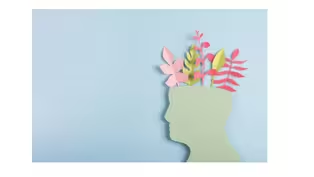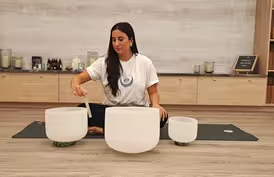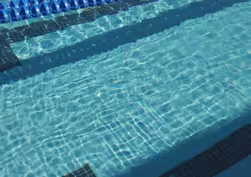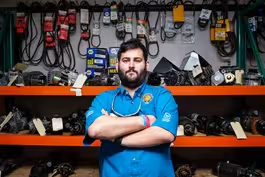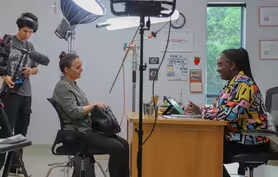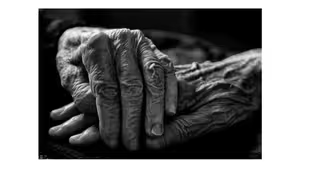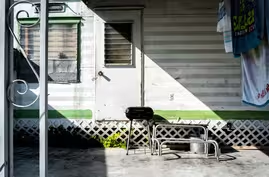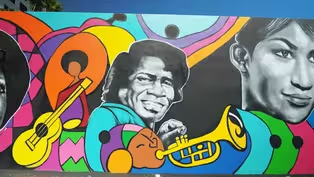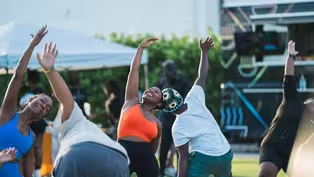Your South Florida
Teaching Every Child to Swim and Protecting Those Most at Risk
Clip: Season 9 | 7m 4sVideo has Closed Captions
Children with autism are 160 times more likely to drown than their neurotypical peers.
Children with autism are 160 times more likely to drown than their neurotypical peers, according to the Autism Society of Florida. This alarming statistic highlights the urgent need for water safety education for all children—especially those on the spectrum.
Problems playing video? | Closed Captioning Feedback
Problems playing video? | Closed Captioning Feedback
Your South Florida is a local public television program presented by WPBT
Your South Florida
Teaching Every Child to Swim and Protecting Those Most at Risk
Clip: Season 9 | 7m 4sVideo has Closed Captions
Children with autism are 160 times more likely to drown than their neurotypical peers, according to the Autism Society of Florida. This alarming statistic highlights the urgent need for water safety education for all children—especially those on the spectrum.
Problems playing video? | Closed Captioning Feedback
How to Watch Your South Florida
Your South Florida is available to stream on pbs.org and the free PBS App, available on iPhone, Apple TV, Android TV, Android smartphones, Amazon Fire TV, Amazon Fire Tablet, Roku, Samsung Smart TV, and Vizio.
Providing Support for PBS.org
Learn Moreabout PBS online sponsorship[Music] drowning is the number one cause of death for children 1 to four It's the number two cause of death for children 5 to 14 It's completely preventable The state of Florida continues to be one of the highest states if not the number one state in the country for drownings And the reason why is we're surrounded with water Everywhere you look there's a body of water whether it's the ocean the Everglades the thousands of pools that we have in our backyard but also uh it only takes 2 in of water for a drowning to occur And so even a swale or a koi pond that may be nearby could be a drowning hazard I feel like the biggest hurdle to address or educate the community about drowning is that people don't think it'll happen to them I think they see it on the news and they just assume that it happens to those type of parents or those type of people or this demographic but it would never happen to me It's been 15 and 1/2 years since I've lost my daughter And I've been trying to answer that question from day one You know where where are we missing it What's happening And time and time again you know I've heard people say that oh my gosh it's a summer issue problem Like it's a summer problem Or it could be those parent those parents should be charged Where were they How dare they What I've always tried to encourage parents to do is think that it can happen to me just like having a flat tire Now what am I going to do to prevent that from happening Nobody wants this to happen to their child you know Nobody The guilt that riddles any parent that this happens to is is overwhelming you know and you could allow it to eat you alive and and and bury this story and bury what happened to your child or you could fight to have a voice When you think about the autism component and drowning it's one that we need to bring to the surface more because the diagnosis of autism doesn't even happen until they're probably in preschool if not early elementary in most cases And yet drowning is the number one cause of death for children 1 to four Children with autism are 160 times more likely to drown And a huge reason for that is because they also have a very high propensity for wandering And in fact 91% of children with autism who die from drowning do so as a result of getting out of the home undetected They're very self-directed That means that they tend to not really think that they need to talk to mom and dad Say "Oh I'm going to go outside."
Um when they have an interest which water is a very high interest just tend to go and want to check it out And if there's no alarms on doors there's no specialized locks on doors and it's easily accessible they're going to go for the water Um that's why we also have a very high level of children with autism who will drown in a lake retention pond canal uh at a much higher level than we see kids who don't have autism Last year out of the uh 18 to 20 kids that we lost in this state to uh lakes retention ponds 16 of those kids were kids with autism Those are also the kids that are not showing up to swim lessons Either the swim school has told the parent "We agree with you your child needs swim lessons but we're not the school We don't have what you need We cannot provide the one-on-one or they don't have patience for the child They're not going to learn at the same speed as other kids And they also have a very hard time generalizing skills which means they may know how to swim over here but then they'll go into another body of water and not know how to swim And we've lost kids that way because we have such a high rate of drowning here The Autism Society of Florida we we do work inside state but we also train even outside of the state We train water safety instructors on how to teach our kids helping them understand a little bit more about how that kid with autism may show up to your swim school and make a beline for the water and just jump in There's something called social stories and we have those free on our website and there's a social story about swim school so that we can prepare the kids before they get there We have families that will share with us swim schools that they've used that have just been really great for our kids It tends to be a little bit more expensive when they get into lessons because they either have to have private or semi-private swim lessons And most parents can't afford that when they're all in all of these other different things to be able to help their children thrive and just do basic skills The International Swimming Hall of Fame is the parent company of Every Child Program We advocate for legislation throughout the country just like fire safety is talked about in the month of October in every school throughout the entire country Our goal is to have every child a swimmer Our legislation be talked about the same way We all know stop drop and roll you know because it's ingrained in our brain at such an early age But nobody talks about water safety and yet it continues to be the number one cause of death for children In 2020 we passed legislation Dr Bill Kent um did who was the chairman of the board of international swimming hall of fame um passed legislation in the state of Florida requiring all schools to share water safety information with the parents and caregivers We also provide learn to swim scholarships to families that cannot afford it So a family that makes below $50,000 a year qualifies for every child swimmer scholarship and they get up to 3 months of swim lessons and each scholarship recipient we guarantee that they're able to have the means to get out of the pool unassisted We're really lucky in that we have um you know we have water smart Florida we have uh Broward County has amazing uh water drowning prevention programs and some a program called swim central The state also last year the governor gave uh $500,000 to a swim voucher which was great but $500,000 is not enough to make sure that every child in Florida knows how to swim So we're constantly seeking additional funds through that swim voucher the local vouchers and just making sure that every child has access to swim lessons Nobody can watch their children 24/7 That's why one layer of protection is never enough We have to have the alarms on the doors fencing around the pools supervision and if your pediatrician doesn't bring it up I want you to bring it up I want you to say to your pediatrician "What do you know about drowning prevention?"
And if they have a child with autism do you understand the connection of drowning and wandering Because that in itself is enormous not only for the autism community but for all children This is serious We lost 105 children in our state alone last year and that does not touch the non-fatals We have to do more you know and it's going to take all of us for that message to be heard by all parents and caregivers
Stronger Together: Helping Families Prepare for Storms
Video has Closed Captions
Clip: S9 | 6m 49s | Broward Cares is a disaster relief partnership that is helping families during and after storms. (6m 49s)
Inspiring the Next Generation of Climate Leaders at MODS
Video has Closed Captions
Clip: S9 | 8m 12s | Young people are discovering their power to protect the planet. (8m 12s)
Designing for a Changing Climate at FAU CES
Video has Closed Captions
Clip: S9 | 11m 44s | Researchers and designers at FAU are building resilience through nature. (11m 44s)
Overcoming Mental Health Challenges for Women in Midlife
Video has Closed Captions
Clip: S9 | 10m 20s | Arlene Borenstein sits down with 2 mental health leaders to discuss helping women navigate midlife. (10m 20s)
Low Cost Mental Health Support for All Ages at Faulk Center
Video has Closed Captions
Clip: S9 | 9m 33s | Mental health challenges can affect anyone. (9m 33s)
Free College Mental Wellness Support from Beyond Grey
Video has Closed Captions
Clip: S9 | 7m 10s | Many college-aged young adults struggle to access mental health support. (7m 10s)
Teaching Every Child to Swim and Protecting Those Most at Risk
Video has Closed Captions
Clip: S9 | 7m 4s | Children with autism are 160 times more likely to drown than their neurotypical peers. (7m 4s)
How The de Moya Foundation Helps Young Adults with Special Abilities Thrive
Video has Closed Captions
Clip: S9 | 11m 58s | 85% of autistic adults are unemployed or underemployed, often due to limited workplace support. (11m 58s)
How Theater Helps Young Adults on the Spectrum Find Their Voice
Video has Closed Captions
Clip: S9 | 7m 6s | For many people on the spectrum, the arts can be a powerful outlet for communication and creativity. (7m 6s)
Why South Florida Seniors Are Struggling to Keep Their Homes
Clip: S9 | 10m 32s | Rising condo fees, unexpected assessments, and stricter building regulations are impacting seniors. (10m 32s)
How 211 Broward is Helping Seniors in Crisis
Clip: S9 | 8m 52s | South Florida seniors are struggling with housing, food, healthcare and social isolation. (8m 52s)
The Disappearing Mobile Home Parks of South Florida
Clip: S9 | 7m 41s | Once a staple of affordable housing, mobile home parks in South Florida are rapidly disappearing. (7m 41s)
Street Art Revolution: Transforming West Palm Beach with Black History & Culture
Video has Closed Captions
Clip: S9 | 5m 57s | In West Palm Beach, Black history isn’t just celebrated in February—it’s honored year-round. (5m 57s)
Miami MoCAAD: Bringing Black History to Life Through Art & Technology
Video has Closed Captions
Clip: S9 | 9m 37s | In this segment, we explore Miami MoCAAD’s latest exhibit—a powerful multimedia experience. (9m 37s)
Anthony Burks Sr: A Passion for Art, Culture & Community
Video has Closed Captions
Clip: S9 | 9m 28s | Florida-based artist Anthony Burks has been creating art his whole life. (9m 28s)
Mindful Eating Made Simple: Hearty Lentil & Vegetable Stew Recipe
Video has Closed Captions
Clip: S9 | 9m 29s | Living a mindful and balanced life includes cultivating a healthy relationship with food. (9m 29s)
Meet the Black Yogis Creating Safe Spaces for Wellness & Unity
Video has Closed Captions
Clip: S9 | 8m 27s | Yoga is a transformative practice but access to inclusive, welcoming spaces remains a challenge. (8m 27s)
3 Steps to Breaking Habits Through Mindfulness
Video has Closed Captions
Clip: S9 | 9m 47s | We explore how mindfulness can play a transformative role in in breaking harmful habits. (9m 47s)
Providing Support for PBS.org
Learn Moreabout PBS online sponsorshipSupport for PBS provided by:
Your South Florida is a local public television program presented by WPBT
